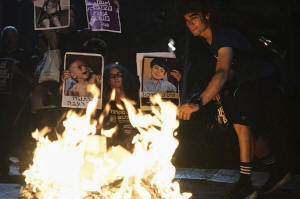Plans to take Gaza City are met with defiance from war-weary
Palestinians and anger by many Israelis
[August 09, 2025]
By SAM MEDNICK and WAFAA SHURAFA
TEL AVIV, Israel (AP) — Israel's decision to take over Gaza City was met
with resignation and defiance by Palestinians who have survived two
years of war and repeated raids. Many Israelis responded with fear and
anger, worried it could be a death sentence for hostages held in Gaza.
Israeli Prime Minister Benjamin Netanyahu announced on Friday that
Israel would intensify its 22-month war with Hamas by taking over Gaza
City, large parts of which have been destroyed by past bombardment and
ground incursions.
A major ground operation is almost sure to cause more mass displacement
and worsen an already catastrophic humanitarian crisis.
“What does (Israel) want from us? ... There is nothing here to occupy,”
said a woman in Gaza City who identified herself as Umm Youssef. “There
is no life here. I have to walk every day for more than 15 minutes to
get drinking water."
Ruby Chen, a dual U.S.-Israeli citizen whose son, Itay, is a hostage
held in Gaza, told The Associated Press that the decision puts the
remaining hostages in danger.
“What is the plan now that is different from the last 22 months?” he
said.
Ehud Olmert, a former prime minister and harsh critic of Netanyahu, told
the AP “there’s not any objective that can be achieved that’s worth the
cost of the lives of the hostages, the soldiers” and civilians, echoing
concerns expressed by many former top security officials in Israel.

‘I will die here’
Netanyahu says military pressure is key to achieving Israel's war goals
of returning all the hostages and destroying Hamas. On Thursday, he told
Fox News that Israel intends to eventually take over all of Gaza and
hand it over to a friendly Arab civilian administration.
But Hamas has survived nearly two years of war and several large-scale
ground operations, including in Gaza City. In a statement, the militant
group said the people of Gaza would “remain defiant against occupation”
and warned Israel that the incursion “will not be a walk in the park.”
Hundreds of thousands of Palestinians fled Gaza City in the opening
weeks of the war, the first of several mass displacements. Many returned
during a ceasefire earlier this year. Now, residents say they are too
busy searching for food and trying to survive amid the city's bombed-out
buildings and tent camps to think about another exodus.
“I have no intention to leave my home, I will die here," said Kamel Abu
Nahel from the city's urban Shati refugee camp.
Israel already controls and has largely destroyed around 75% of the Gaza
Strip, with most of its population of some 2 million Palestinians now
sheltering in Gaza City, the central city of Deir al-Balah and the
sprawling displacement camps in the Muwasi area along the coast.
The offensive has killed over 61,000 Palestinians, according to the Gaza
Health Ministry, which does not say how many were fighters or civilians.
It says women and children make up around half the dead. The ministry is
part of the Hamas-run government and staffed by medical professionals.
The United Nations and other experts consider its figures to be the most
reliable estimate of casualties, while Israel disputes them.
[to top of second column]
|

Israeli activists protest against the war in the Gaza Strip,
Israel's measures regarding food distribution and the forced
displacement, in Tel Aviv, Israel, Thursday, Aug. 7, 2025. (AP
Photo/Ariel Schalit)

Ismail Zaydah said he and his family had remained in Gaza City
throughout the war.
“This is our land, there is no other place for us to go,” he said.
“We are not surrendering ... We were born here, and here we die."
‘This madman called Netanyahu’
Hamas-led militants abducted 251 people in the Oct. 7, 2023 attack
that started the war and killed around 1,200 people, mostly
civilians. Though most of the hostages have been released in
ceasefires or other deals, 50 are still in Gaza, less than half of
them believed by Israel to be alive.
Relatives of many of the hostages and their supporters have
repeatedly protested against the continuation of the war, demanding
that Israel reach a ceasefire with Hamas that would include the
return of their loved ones. The long-running talks broke down last
month.
“Somebody’s got to stop this madman called Netanyahu,” said Yehuda
Cohen, whose son Nimrod is held hostage. He said faith in the United
States to help is also dwindling. “I lost hope with Donald Trump ...
he’s letting Netanyahu just do whatever he likes,” he said.
But other Israelis voiced support for the decision.
“They need to go after Hamas,” said Susan Makin, a Tel Aviv
resident. “Why are they not asking why Hamas has not given back the
hostages and put (down) their arms?”
The agony around the plight of the hostages has worsened in recent
days as Palestinians militants have released videos showing two of
the captives emaciated and pleading for their lives. Families fear
their loved ones, who may be held in other parts of Gaza, are
running out time.
Amir Avivi, a retired Israeli general and chairman of Israel’s
Defense and Security Forum, said there are a few hostages in Gaza
City and the army will have to decide how to manage the situation.
He said they might be able to surround the hostages and negotiate
directly with their captors or leave those areas untouched. Under
pressure, Hamas might decide to release the captives, he said.
That strategy carries great risk. Last year, Israeli forces
recovered the bodies of six hostages who were killed by their
captors when troops approached the tunnel where they were being
held.
___
Shurafa reported from Deir al-Balah, Gaza Strip. Associated Press
reporter Shlomo Mor in Tel Aviv contributed.
All contents © copyright 2025 Associated Press. All rights reserved
 |